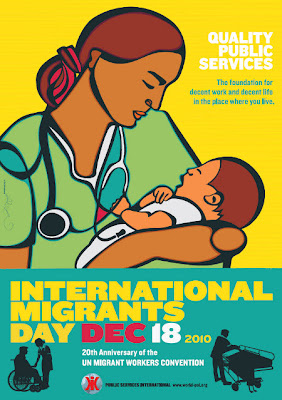We cannot treat migration and development without human rights
Public Services International
According to the United Nations, there are around 215 million people today who live and work outside their countries of birth. About half of these international migrants are women, working to support their families and communities back home.
Despite the huge contribution that migrant workers bring to their host and home countries in terms of services, taxes, remittances (currently at $315 billion) and the rich culture they bring, many countries are still far from fulfilling their obligation to protect migrant workers’ rights. This year marks the 20th anniversary of the United Nations General Assembly adoption of the International Convention on the Protection of the Rights of all Migrant Workers and Members of Their Families.
The UN Migrant Workers’ Convention, together with the International Labour Organization Migrant Workers Conventions, C97 and C143, offer the most comprehensive body of human rights norms and standards in the protection of migrant workers’ rights.
“It is very concerning to see many countries hesitating to commit to these rights by delaying their ratification of these core human rights instruments and labour standards. There is virtually no country in this world that does not depend on migrant workers to address their workforce needs. We particularly challenge destination countries of migrant workers to ratify the conventions and to do it now”, declares Peter Waldorff, General Secretary of Public Services International.
Public Services International represents 20 million workers involved in the delivery of public services. About 7 million workers affiliated to PSI work in the health and social care services which are seeing an increasing phenomenon of migration. Currently, there is a global shortage of 4.3 million health workers and they are unequally distributed between developing and industrialised countries. These shortages are further exacerbated by the migration of health workers from poorer countries. In countries where public health services are already fragile, this poses a serious threat to people’s welfare and may effectively hinder sustainable development.
“If governments are indeed serious in addressing the developmental impact of migration as well as migration’s contribution to development, they should begin by anchoring their policies on the framework of human rights,” says Waldorff.


No comments:
Post a Comment